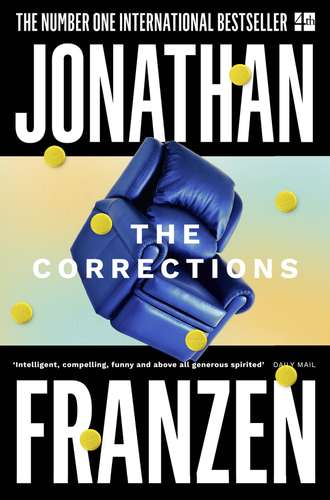
Полная версия
The Corrections
He knocked on the glass until Eden emerged from her office and peered out at him. Eden had high cheekbones and big watery blue eyes and thin translucent skin. Any extra calories she ate at lunch in L.A. or drank as martinis in Manhattan got burned on her home treadmill or at her private swim club or in the general madness of being Eden Procuro. She was ordinarily electric and flaming, a bundle of hot copper wire; but her expression now, as she approached the door, was tentative or flustered. She kept looking back at her office.
Chip gestured that he wanted in.
“She’s not here,” Eden said through the glass.
Chip gestured again. Eden opened the door and put her hand on her heart. “Chip, I’m so sorry about you and Julia—”
“I’m looking for my script. Have you read it?”
“I—? Very hastily. I need to read it again. Need to take some notes!” Eden made a scribbling motion near her temple and laughed.
“That opening monologue,” Chip said. “I’ve cut it.”
“Oh, good, I love a willingness to cut. Love it.” She looked back at her office.
“Do you think, though, that without the monologue—”
“Chip, do you need money?”
Eden smiled up at him with such odd merry frankness that he felt as if he’d caught her drunk or with her pants down.
“Well, I’m not flat broke,” he said.
“No, no, of course. But still.”
“Why?”
“And how are you with the Web?” she said. “Do you know any Java? HTML?”
“God, no.”
“Well, just, come back to my office for a second. Do you mind? Come on back.”
Chip followed Eden past Julia’s desk, where the only visible Julian artifact was a stuffed toy frog on the computer monitor.
“Now that you two have broken up,” Eden said, “there’s really no reason you can’t—”
“Eden, it’s not a breakup.”
“No, no, trust me, it’s over,” Eden said. “It is absolutely over. And I’m thinking you might enjoy a little change of scenery, so you can start getting over it—”
“Eden, listen, Julia and I are having a momentary—”
“No, Chip, sorry, not momentary: permanent.” Eden laughed again. “Julia may not be blunt, but I am. And so, when I think about it, there’s really no reason for you not to meet…” She led Chip into her office. “Gitanas? Incredible stroke of luck here. I have, here, the perfect man for the job.”
Reclining in a chair by Eden’s desk was a man about Chip’s age in a red ribbed leather jacket and tight white jeans. His face was broad and baby-cheeked, his hair a sculpted blond shell.
Eden was practically climaxing with enthusiasm. “Here I’ve been racking my brain, Gitanas, I can’t think of anyone to help you, and probably the best-qualified man in New York City is knocking at the door! Chip Lambert, you know my assistant Julia?” She winked at Chip. “Well, this is Julia’s husband, Gitanas Misevi

In almost every respect—coloration, shape of head, height and build, and especially the wary, shame-faced smile that he was wearing—Gitanas looked more like Chip than anybody Chip could remember meeting. He was like Chip with bad posture and crooked teeth. He nodded nervously without standing up or extending a hand. “How’s it going,” he said.
It was safe to say, Chip thought, that Julia had a type.
Eden patted the seat of an unoccupied chair. “Sit sit sit,” she told him.
Her daughter, April, was on the leather sofa by the windows with a mess of crayons and a sheaf of paper.
“April, hey,” Chip said. “How were those desserts?”
The question seemed not to April’s liking.
“She’ll try those tonight,” Eden said. “Somebody was testing limits last night.”
“I was not testing limits,” April said.
The paper on April’s lap was ivory-colored and had text on its reverse.
“Sit! Sit!” Eden exhorted as she retreated to her birch-laminate desk. The big window behind her was lensed with rain. There was fog on the Hudson. Blackish smudges suggestive of New Jersey. Eden’s trophies, on the walls, were movie-ad images of Kevin Kline, Chloë Sevigny, Matt Damon, Winona Ryder.
“Chip Lambert,” she told Gitanas, “is a brilliant writer, with a script in development with me right now, and he’s got a Ph.D. in English, and, for the last two years, he’s been working with my husband doing mergers and acquisitions, and he’s brilliant with all the Internet stuff, we were just now talking about Java and HTML, and, as you see, he cuts a very impressive, uh—” Here Eden for the first time actually gave her attention to Chip’s appearance. Her eyes widened. “It must be raining cats and dogs out there. Chip’s not, well, ordinarily quite so wet. (My dear, you are very wet.) In all honesty, Gitanas, you won’t find a better man. And Chip, I’m just—delighted—that you came by. (Although you are very wet.)”
A man by himself could weather Eden’s enthusiasm, but two men together had to gaze at the floor to preserve their dignity in the face of it.
“I, unfortunately,” Eden said, “am slightly pressed for time. Gitanas having dropped in somewhat unexpectedly. What I would love is if the two of you could go and use my conference room and work things out, and take as long as you like.”
Gitanas crossed his arms in the wound-up European style, his fists jammed in his armpits. He didn’t look at Chip but asked him: “Are you an actor?”
“No.”
“Well, Chip,” Eden said, “that’s not strictly true.”
“Yes, it is. I’ve never acted in my life.”
“Ha-ha-ha!” Eden said. “Chip is being modest.”
Gitanas shook his head and looked at the ceiling.
April’s sheaf of paper was definitely a screenplay.
“What are we talking about?” Chip said.
“Gitanas is looking to hire someone—”
“An American actor,” Gitanas said with disgust.
“To do, uh, corporate PR for him. And for more than an hour now”—Eden glanced at her watch and let her eyes and mouth distend in exaggerated shock—“I’ve been trying to explain that the actors I work with are more interested in film and stage than in, say, international investment schemes. And tend, also, to have wildly inflated notions of their own literacy. And what I’m trying to explain to Gitanas is that you, Chip, not only have an excellent command of language and jargon, but you don’t have to pretend to be an investment expert. You are an investment expert.”
“I’m a part-time legal proofreader,” Chip said.
“An expert in the language. A gifted screenwriter.”
Chip and Gitanas traded glances. Something about Chip’s person, perhaps the shared physical traits, seemed to interest the Lithuanian. “Are you looking for work?” Gitanas said.
“Possibly.”
“Are you a drug addict?”
“No.”
“I’ve got to go to the bathroom,” Eden said. “April, honey, come along. Bring your drawings.”
April obediently hopped off the sofa and went to Eden.
“Bring your drawings, though, honey. Here.” Eden gathered up the ivory pages and led April to the door. “You men talk.”
Gitanas put a hand to his face and squeezed his round cheeks, scratched his blond stubble. He looked out the window.
“You’re in government,” Chip said.
Gitanas tilted his head. “Yes and no. I was for many years. But my party is kaput, I’m an entrepreneur now. Sort of a governmental entrepreneur, let’s say.”
One of April’s drawings had fallen to the floor between the window and the sofa. Chip extended a toe and pulled the page toward him.
“We have so many elections,” Gitanas said, “nobody reports them internationally anymore. We have three or four elections a year. Elections are our biggest industry. We have the highest annual per capita output of elections of any country in the world. Higher than Italy, even.”
April had drawn a portrait of a man with a regular body of sticks and blobs and oblongs, but for a head he had a black and blue snarled vortex, a ratty scrabble, a scribbled mess. Through the ivory bond, Chip could see faint blocks of dialogue and action on the other side.
“Do you believe in America?” Gitanas said.
“Jesus, where to begin,” Chip said.
“Your country which saved us also ruined us.”
With his toe Chip lifted one corner of April’s drawing and identified the words—
MONA
(cradling the revolver)
What’s wrong with being in love with myself? Why is that a problem?
—but the page had grown very heavy or his toe very weak. He let the page lie flat again. He pushed it underneath the sofa. His extremities had gone cool and a little bit numb. He couldn’t see well.
“Russia went bankrupt in August,” Gitanas said. “Maybe you heard? Unlike our elections, this was widely reported. This was economic news. This mattered to the investor. It also mattered to Lithuania. Our main trading partner now has crippling hard-currency debts and a worthless ruble. One guess which they use, dollars or rubles, to buy our hens’ eggs. And to buy our truck undercarriages from our truck-undercarriage plant, which is the one good plant we have: well, it would be rubles. But the rest of the truck is made in Volgograd, and that plant closed. So we can’t even get rubles.”
Chip was having trouble feeling disappointed about “The Academy Purple.” Never to look at the script again, never to show it to a soul: this might be a relief even greater than his relief in the men’s room of Fanelli’s where he’d taken the salmon from his pants.
From an enchantment of breasts and hyphens and one-inch margins he felt himself awakening to a rich and varied world to which he’d been dead for who knew how long. Years.
“I’m interested in what you’re telling me,” he told Gitanas.
“It’s interesting. It is interesting,” Gitanas agreed, still hugging himself tensely. “Brodsky said, ‘Fresh fish always smells, frozen smells only when it thaws.’ So, and after the big thaw, when all the little fish came out of the freezer, we were passionate about this and that. I was part of it. Very much part of it. But the economy was mismanaged. I had my fun in New York, but back home—there was a depression, all right. Then, too late, 1995, we pegged the litas to the dollar and started privatizing, way too fast. It wasn’t my decision, but I might have done the same. The World Bank had money that we wanted, and the World Bank said privatize. So OK, we sold the port. We sold the airline, sold the phone system. The highest bidder was usually American, sometimes Western European. This wasn’t supposed to happen, but it did. Nobody in Vilnius had cash. And the phone company said, OK, we’ll have foreign owners with deep pockets, but the port and the airline will still be a hundred percent Lithuanian. Well, the port and the airline were thinking the same. But still it was OK. Capital was flowing, better cuts of meat at the butcher, fewer brownouts. Even the weather seemed milder. Mostly criminals took the hard currency, but that’s post-Soviet reality. After the thaw, you get the rot. Brodsky didn’t live to see that. So OK, but then all the world economies started collapsing, Thailand, Brazil, Korea, and this was a problem, because all the capital ran home to the U.S. We found out, for example, that our national airline was sixty-four percent owned by the Quad Cities Fund. Which is? A no-load growth fund managed by a young guy named Dale Meyers. You never heard of Dale Meyers, but every adult citizen of Lithuania knows his name.”
This tale of failure seemed to amuse Gitanas greatly. It had been a long time since Chip had had such a powerful sensation of liking somebody. His queer friends at D—— College and the Warren Street Journal were so frank and headlong in their confidences that they foreclosed actual closeness, and his responses to straight men had long fallen into one of two categories: fear and resentment of the successes, flight from the contagion of the failures. But something in Gitanas’s tone appealed to him.
“Dale Meyers lives in eastern Iowa,” Gitanas said. “Dale Meyers has two assistants, a big computer, and a three-billion-dollar portfolio. Dale Meyers says he didn’t mean to acquire a controlling stake in our national airline. Dale says it was program trading. He says one of his assistants misentered data that caused the computer to keep increasing its position in Lithuanian Airlines without reporting the overall size of the accumulated stake. OK, Dale apologizes to all Lithuanians for the oversight. Dale says he understands the importance of an airline to a country’s economy and self-esteem. But because of the crisis in Russia and the Baltics, nobody wants tickets on Lithuanian Airlines. So, and American investors are pulling money out of Quad Cities. Dale’s only way to meet his obligations is liquidate Lithuanian Airlines’ biggest asset. Which is its fleet. He’s gonna sell three YAK40s to a Miami-based air freight company. He’s gonna sell six Aerospatiale turboprops to a start-up commuter airline in Nova Scotia. In fact, he already did that, yesterday. So, whoops, no airline.”
“Ouch,” Chip said.
Gitanas nodded fiercely. “Yeah! Yeah! Ouch! Too bad you can’t fly a truck undercarriage! OK, and then. Then an American conglomerate called Orfic Midland liquidates the Port of Kaunas. Again, overnight. Whoops! Ouch! And then sixty percent of the Bank of Lithuania gets eaten up by a suburban bank in Atlanta, Georgia. And your suburban bank then liquidates our bank’s hard-currency reserves. Your bank doubles our country’s commercial interest rates overnight—why? To cover heavy losses in its failed line of Dilbert affinity MasterCards. Ouch! Ouch! But interesting, huh? Lithuania’s not being such a successful player, is it? Lithuania really fucked things up!”
“How are you men doing?” Eden said, returning to her office with April in tow. “Maybe you want to use the conference room?”
Gitanas put a briefcase on his lap and opened it. “I’m explaining to Cheep my gripe with America.”
“April, sweetie, sit down here,” Eden said. She had a big pad of newsprint which she opened on the floor near the door. “This is better paper for you. You can make big pictures now. Like me. Like Mommy. Make a big picture.”
April crouched in the middle of the newsprint pad and drew a green circle around herself.
“We’ve petitioned the IMF and World Bank for assistance,” Gitanas said. “Since they encouraged us to privatize, maybe they’re interested in the fact that our privatized nation-state is now a zone of semi-anarchy, criminal warlords, and subsistence farming? Unfortunately, IMF is handling complaints of bankrupt client states in order of the size of their respective GDPs. Lithuania was twenty-six on the list last Monday. Now we’re twenty-eight. Paraguay just beat us. Always Paraguay.”
“Ouch,” Chip said.
“Paraguay being for some reason the bane of my existence.”
“Gitanas, I told you, Chip is perfect,” Eden said. “But listen—”
“IMF says expect delays of up to thirty-six months before any rescue can begin!”
Eden slumped into her chair. “Do you think we can wrap this up fairly soon?”
Gitanas showed Chip a printout from his briefcase. “You see, here, this Web page? ‘A service of the U.S. Department of State, Bureau of European and Canadian Affairs.’ It says: Lithuanian economy severely depressed, unemployment nearly twenty percent, electricity and running water intermittent in Vilnius, scarce elsewhere. What kind of businessman is going to put money in a country like that?”
“A Lithuanian businessman?” Chip said.
“Yes, funny.” Gitanas gave him an appreciative look. “But what if I need something different on this Web page and others like it? What if I need to erase what’s here and put, in good American English, that our country escaped the Russian financial plague? Like, say, Lithuania now has an annual inflation rate less than six percent, per capita dollar reserves same as Germany, and a trade surplus of nearly one hundred million dollars, due to continued strong demand for Lithuania’s natural resources!”
“Chip, you’d be perfect for this,” Eden said.
Chip had quietly and firmly resolved never to look at Eden or say a word to her again for as long as he lived.
“What are Lithuania’s natural resources?” he asked Gitanas.
“Chiefly sand and gravel,” Gitanas said.
“Huge strategic reserves of sand and gravel. OK.”
“Sand and gravel in abundance.” Gitanas closed his briefcase. “However, so, here’s a quiz for you. Why the unprecedented demand for these intriguing resources?”
“A construction boom in nearby Latvia and Finland? In sand-starved Latvia? In gravel-starved Finland?”
“And how did these countries escape the contagion of global financial collapse?”
“Latvia has strong, stable democratic institutions,” Chip said. “It’s the financial nerve center of the Baltics. Finland placed strict limits on the outflow of short-term foreign capital and succeeded in saving its world-class furniture industry.”
The Lithuanian nodded, obviously pleased. Eden pounded her fists on her desk. “God, Gitanas, Chip’s fantastic! He is so entitled to a signing bonus. Also first-class accommodations in Vilnius and a per diem in dollars.”
“Vilnius?” Chip said.
“Yeah, we’re selling a country,” Gitanas said. “We need a satisfied U.S. customer on site. Also much, much safer to work on the Web over there.”
Chip laughed. “You actually expect American investors to send you money? On the basis of, what. Of sand shortages in Latvia?”
“They’re already sending me money,” Gitanas said, “on the basis of a little joke I played. Not even sand and gravel, just a mean little joke I played. Tens of thousands of dollars already. But I want them to send me millions.”
“Gitanas,” Eden said. “Dear man. This is completely a point-incentive moment. There could not be a more perfect situation for an escalator clause. Every time Chip doubles your receipts, you give him another point of the action. Hm? Hm?”
“If I see a hundred-times increase in receipts, trust me, Cheep will be a wealthy man.”
“But I’m saying let’s have this in writing.”
Gitanas caught Chip’s eye and silently conveyed to him his opinion of their host. “Eden, this document,” he said. “What is Cheep’s job designation? International Wire Fraud Consultant? First Deputy Co-Conspirator?”
“Vice President for Willful Tortious Misrepresentation,” Chip offered.
Eden gave a scream of pleasure. “I love it!”
“Mommy, look,” April said.
“Our agreement is strictly oral,” Gitanas said.
“Of course, there’s nothing actually illegal about what you’re doing,” Eden said.
Gitanas answered her question by staring out the window for a longish while. In his red ribbed jacket he looked like a motocross rider. “Of course not,” he said.
“So it isn’t wire fraud,” Eden said.
“No, no. Wire fraud? No.”
“Because, not to be a scaredy-cat here, but wire fraud is what this almost sounds like.”
“The collective fungible assets of my country disappeared in yours without a ripple,” Gitanas said. “A rich powerful country made the rules we Lithuanians are dying by. Why should we respect these rules?”
“This is an essential Foucaultian question,” Chip said.
“It’s also a Robin Hood question,” Eden said. “Which doesn’t exactly reassure me on the legal front.”
“I’m offering Cheep five hundred dollars American a week. Also bonuses as I see fit. Cheep, are you interested?”
“I can do better here in town,” Chip said.
“Try a thousand a day, minimum,” Eden said.
“A dollar goes a long way in Vilnius.”
“Oh, I’m sure,” Eden said. “It goes a long way on the moon, too. What’s to buy?”
“Cheep,” Gitanas said. “Tell Eden what dollars can buy in a poor country.”
“I imagine you eat and drink pretty well,” Chip said.
“A country where a young generation grew up in a state of moral anarchy, and are hungry.”
“Probably not hard to find a good-looking date, if that’s what you mean.”
“If it doesn’t break your heart,” Gitanas said. “To see a sweet little girl from the provinces get down on her knees—”
“Uch, Gitanas,” Eden said. “There’s a child in the room.”
“I’m on an island,” April said. “Mommy, look at my island.”
“I’m talking about children,” Gitanas said. “Fifteen-year-olds. You have dollars? Thirteen. Twelve.”
“Twelve years old is not a selling point with me,” Chip said.
“You prefer nineteen? Nineteen comes even cheaper.”
“This frankly, um,” Eden said, flapping her hands.
“I want Cheep to understand why a dollar is a lot of money. Why my offer is a valid offer.”
“My problem,” Chip said, “is I’d be servicing American debts with those very same dollars.”
“Believe me, we’re familiar with this problem in Lithuania.”
“Chip wants a base salary of a thousand a day, plus performance incentives,” Eden said.
“One thousand per week,” Gitanas said. “For lending legitimacy to my project. For creative work and reassuring callers.”
“One percent of gross,” Eden said. “One point minus his twenty-thousand-dollar monthly salary.”
Gitanas, ignoring her, took a thick envelope from his jacket and, with hands that were stubby and unmanicured, began to count out hundreds. April was crouched on a patch of white newsprint surrounded by toothed monsters and cruel scribbles in several colors. Gitanas tossed a stack of hundreds on Eden’s desk. “Three thousand,” he said, “for the first three weeks.”
“He gets business-class plane fare, too, of course,” Eden said.
“Yes, all right.”
“And first-class accommodations in Vilnius.”
“There’s a room in the villa, no problem.”
“Also, who protects him from these criminal warlords?”
“Maybe I’m a criminal warlord myself, a little bit,” Gitanas said with a wary, shame-faced smile.
Chip considered the mess of green on Eden’s desk. Something was giving him a hard-on, possibly the cash, possibly the vision of corrupt and sumptuous nineteen-year-olds, or maybe just the prospect of getting on a plane and putting five thousand miles between himself and the nightmare of his life in New York City. What made drugs perpetually so sexy was the opportunity to be other. Years after he’d figured out that pot only made him paranoid and sleepless, he still got hard-ons at the thought of smoking it. Still lusted for that jailbreak.
He touched the hundreds.
“Why don’t I get online and make plane reservations for you both,” Eden said. “You can leave right away!”
“So, you gonna do this thing?” Gitanas asked. “It’s a lot of work, lot of fun. Pretty low risk. No such thing as no risk, though. Not where there’s money.”
“I understand,” Chip said, touching the hundreds.
In the pageantry of weddings Enid reliably experienced the paroxysmal love of place—of the Midwest in general and suburban St. Jude in particular—that for her was the only true patriotism and the only viable spirituality. Living under presidents as crooked as Nixon and stupid as Reagan and disgusting as Clinton, she’d lost interest in American flag-waving, and not one of the miracles she’d ever prayed to God for had come to pass; but at a Saturday wedding in the lilac season, from a pew of the Paradise Valley Presbyterian Church, she could look around and see two hundred nice people and not a single bad one. All her friends were nice and had nice friends, and since nice people tended to raise nice children, Enid’s world was like a lawn in which the bluegrass grew so thick that evil was simply choked out: a miracle of niceness. If, for example, it was one of Esther and Kirby Root’s girls coming down the Presbyterian aisle on Kirby’s arm, Enid would remember how the little Root had trick-or-treated in a ballerina costume, vended Girl Scout cookies, and baby-sat Denise, and how, even after the Root girls had gone off to good midwestern colleges, they all still made a point, when home on holiday, of tapping on Enid’s back door and filling her in on the doings chez Root, often sitting and visiting for an hour or more (and not, Enid knew, because Esther had told them to come over but just because they were good St. Jude kids who naturally took an interest in other people), and Enid’s heart would swell at the sight of yet another sweetly charitable Root girl now receiving, as her reward, the vows of a young man with a neat haircut of the kind you saw in ads for menswear, a really super young fellow who had an upbeat attitude and was polite to older people and didn’t believe in premarital sex, and who had a job that contributed to society, such as electrical engineer or environmental biologist, and who came from a loving, stable, traditional family and wanted to start a loving, stable, traditional family of his own. Unless Enid was very much deceived by appearances, young men of this caliber continued, even as the twentieth century drew to a close, to be the norm in suburban St. Jude. All the young fellows she’d known as Cub Scouts and users of her downstairs bathroom and shovelers of her snow, the many Driblett boys, the various Persons, the young Schumpert twins, all these clean-cut and handsome young men (whom Denise, as a teenager, to Enid’s quiet rage, had dismissed with her look of “amusement”), had marched or would soon be marching down heartland Protestant aisles and exchanging vows with nice, normal girls and settling down, if not in St. Jude itself, then at least in the same time zone. Now, in her secret heart, where she was less different from her daughter than she liked to admit, Enid knew that tuxes came in better colors than powder blue and that bridesmaids’ dresses could be cut from more interesting fabrics than mauve crepe de chine; and yet, although honesty compelled her to withhold the adjective “elegant” from weddings in this style, there was a louder and happier part of her heart that loved this kind of wedding best of all, because a lack of sophistication assured the assembled guests that for the two families being joined together there were values that mattered more than style. Enid believed in matching and was happiest at a wedding where the bridesmaids suppressed their selfish individual desires and wore dresses that matched the corsages and cocktail napkins, the icing on the cake, and the ribbons on the party favors. She liked a ceremony at Chiltsville Methodist to be followed by a modest reception at the Chiltsville Sheraton. She liked a more elegant wedding at Paradise Valley Presbyterian to culminate in the clubhouse at Deepmire, where even the complimentary matches (Dean & Trish









